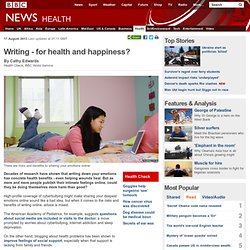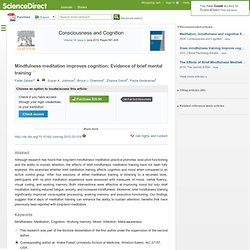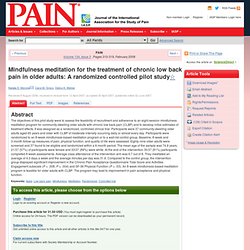

Tara Brach - How to Meditate. You are traveling a path that has led to clarity, peace and deep realization for many people over thousands of years.

May their awakening support and inspire you. And may the sincerity of your practice heal and free your spirit. — Tara Brach. Writing - for health and happiness? 17 August 2013Last updated at 01:11 GMT By Cathy Edwards Health Check, BBC World Service There are risks and benefits to sharing your emotions online Decades of research have shown that writing down your emotions has concrete health benefits - even helping wounds heal.

But as more and more people publish their intimate feelings online, could they be doing themselves more harm than good? High-profile coverage of cyberbullying might make sharing your deepest emotions online sound like a bad idea, but when it comes to the risks and benefits of writing online, advice is mixed. The American Academy of Pediatrics, for example, suggests questions about social media are included in visits to the doctor, a move prompted by worries about cyberbullying, internet addiction and sleep deprivation. On the other hand, blogging about health problems has been shown to improve feelings of social support, especially when that support is lacking from family and friends.
Fight or Flight Response V's Relaxation Response. When the fight or flight response happens our brain waves move into the higher Beta waves, producing heaps of cortisol which is known as the stress hormone and is extremely bad for your health.

When we are in this state our blood flow is directed away from the brain and sent toward the periphery of the body, our bloodstream is flooded with sugar, our heart rate, blood pressure and breathing, rapidly increases, enabling us to prepare to defend ourselves by fighting or fleeing a dangerous situation. In this state, learning ability, as well as other mental functions including problem solving and reasoning ability are inhibited. This response is incredible and can indeed be life-saving. However many people experience this response on a regular basis through pressure at work, traffic jams, relationships and many more situations that are not life-threatening.
What we need to create in our lives is the relaxation response. Relaxation Response. 10 Big Companies That Promote Employee Meditation. Work can be a stressful place, and with companies trying to keep an eye on the bottom line while simultaneously improving productivity, many workers may find themselves with more responsibilities than ever before.

While there is no way to totally eliminate stress from the workplace, some companies are doing what they can to help employees relax, and many, like those that we feature here, are doing that through on-site meditation. Meditation has been shown to produce a wide range of mental benefits when practiced on a daily basis. Studies have shown that it can actually change how the brain processes information and manages the effects of stress, depression, and anxiety.
Mercy - definition of mercy by the Free Online Dictionary. Mercy[ˈmɜːsɪ] 2. (= discretion)to be at the mercy of sth/sb → estar a merced de algo/algnto be left to the tender mercies of sb (esp hum) → quedar a merced de algnto throw o.s. on sb's mercy → ponerse en(las)manos de algn B.CPDmercy flightN → vuelo m de ayuda(para ayudar a alguien necesitado en una guerra, etc)mercy killingN → eutanasia f Collins Spanish Dictionary - Complete and Unabridged 8th Edition 2005 © William Collins Sons & Co.

Ltd. 1971, 1988 © HarperCollins Publishers 1992, 1993, 1996, 1997, 2000, 2003, 2005. Mental Workout® - Official store. UCSD Center for Mindfulness. Andy Puddicombe: All it takes is 10 mindful minutes. Increase in cerebral blood flow of right prefrontal cortex in man during orgasm. Abstract The functional anatomy of human emotional responses has remained poorly understood, mainly because invasive experiments in humans are unacceptable due to ethical reasons.

The new functional imaging techniques such as positron emission tomography and single photon emission computed tomography have made it possible to study the neurophysiology of living humans non-invasively. We studied the regional cerebral blood flow with semi-quantitative 99mTC-HMPAO single photon emission computed tomography in eight healthy right-handed heterosexual males during orgasm. The results showed decrease of cerebral blood flow during orgasm in all other cortical areas except in right prefrontal cortex, where the cerebral blood flow increased significantly (P < 0.005). Keywords. 10 Simple, Science-Backed Ways To Be Happier Today. Editor's Note: This is one of the most-read leadership articles of 2013.

Click here to see the full list. Happiness is so interesting, because we all have different ideas about what it is and how to get it. It’s also no surprise that it’s the Nr.1 value for Buffer’s culture, if you see our slidedeck about it. So naturally we are obsessed with it. Mindfulness meditation improves cognition: Evidence of brief mental training. Abstract Although research has found that long-term mindfulness meditation practice promotes executive functioning and the ability to sustain attention, the effects of brief mindfulness meditation training have not been fully explored.

We examined whether brief meditation training affects cognition and mood when compared to an active control group. After four sessions of either meditation training or listening to a recorded book, participants with no prior meditation experience were assessed with measures of mood, verbal fluency, visual coding, and working memory. Both interventions were effective at improving mood but only brief meditation training reduced fatigue, anxiety, and increased mindfulness.
Mindfulness meditation for the treatment of chronic low back pain in older adults: A randomized controlled pilot study. Received 8 August 2006; received in revised form 12 April 2007; accepted 30 April 2007. published online 02 June 2007.

The objectives of this pilot study were to assess the feasibility of recruitment and adherence to an eight-session mindfulness meditation program for community-dwelling older adults with chronic low back pain (CLBP) and to develop initial estimates of treatment effects. It was designed as a randomized, controlled clinical trial. Participants were 37 community-dwelling older adults aged 65 years and older with CLBP of moderate intensity occurring daily or almost every day. Participants were randomized to an 8-week mindfulness-based meditation program or to a wait-list control group. Baseline, 8-week and 3-month follow-up measures of pain, physical function, and quality of life were assessed.
Mindfulness meditation for the treatment of chronic low back pain in older adults: A randomized controlled pilot study. Mindfulness-based stress reduction and health benefits: A meta-analysis. Received 5 March 2003; accepted 8 July 2003.

Objective Mindfulness-based stress reduction (MBSR) is a structured group program that employs mindfulness meditation to alleviate suffering associated with physical, psychosomatic and psychiatric disorders. The program, nonreligious and nonesoteric, is based upon a systematic procedure to develop enhanced awareness of moment-to-moment experience of perceptible mental processes. PsycNET - Display Record. Live. Why You Should Take Stress More Seriously. Stressed out? That could be dangerous. Photo: Troels Graugaard/Getty ImagesIf you’re someone who frequently declares, “I’m so stressed!” Then you might want to pay attention to this: Your risk of heart attack could be double that of folks who don't think they're stressed, according to a new study. More on Shine: The Best Steps to Keep Your Stress in Check The findings, by French researchers and published Wednesday in the European Heart Journal, showed that people who believe that they are stressed—and that the stress is affecting their health—have more than twice the risk of heart attack as those who don’t feel that way.
On emotional healing — moods vs. emotions. An essential key to emotional healing, or any healing, is the ability to experience our emotions fully. Seems like that should be simple, but it’s not. We’re incredibly complex beings whose past conditioning often makes the experience of emotions complicated. From the point of view of energy medicine, emotions are a form of energy and energy needs to flow freely for health. Full Catastrophe Living Kabat Zinn pdf free ebook download from www.lelandshields. Dr. Jon Kabat-Zinn's Benefit for Mindful Schools: The Role of Mindfulness in Education. Jon kabat zinn mindfulness meditation. Evolve... Mindfulness @Work™ 8-Week Worksite Program - UMass Medical School. Evolve... Seven Lessons in Six Weeks: Learning to be Mindful in the Workplace - UMass Medical School. Finding an MBSR Teacher Don't live near the UMASS Center for Mindfulness?
Find the best-trained, most experienced MBSR teachers worldwide with our certified MBSR Teacher Search. Search now Fall Teaching Institute 2017 Four continuous months of exciting mindfulness-based professional education and training starting in September. Jon Kabat-Zinn: Coming to Our Senses. Cognitive Neuroscience of Mindfulness Meditation. Evidence builds that meditation strengthens the brain. Earlier evidence out of UCLA suggested that meditating for years thickens the brain (in a good way) and strengthens the connections between brain cells. Now a further report by UCLA researchers suggests yet another benefit. Eileen Luders, an assistant professor at the UCLA Laboratory of Neuro Imaging, and colleagues, have found that long-term meditators have larger amounts of gyrification ("folding" of the cortex, which may allow the brain to process information faster) than people who do not meditate.
Dr. Dan Siegel - Home. Fmri mindfulness. Functional MRI Shows How Mindfulness Meditation Changes Decision-Making Process : Sleep Compass. You are here: Home / Gus / Functional MRI Shows How Mindfulness Meditation Changes Decision-Making Process ScienceDaily (Apr. 21, 2011) — New research shows that Buddhist meditators use different areas of the brain than other people when confronted with unfair choices, enabling them to make decisions rationally rather than emotionally.
If a friend or relative won $100 and then offered you a few dollars, would you accept this windfall? The logical answer would seem to be, sure, why not? “But human decision making does not always appear rational,” said Read Montague, professor of physics at Virginia Tech and director of the Human Neuroimaging Laboratory at the Virginia Tech Carilion Research Institute. According to research conducted over the last three decades; only about one-fourth of us would say, “Sure. The Noisy Mind. The Impact of Mind Wandering on Chronic Pain. Mindfulness Based Stress Reduction (MBSR) in Boston. The Power of Concentration. Infinite Monkeys - The Machine - Beta. Wellness. Risk Management Wellness Service Providers. Resources « Beth Meeker LMHC. Experiment #1: An experimental ongoing Sunday series to share information and processes that move us more deeply into our relationship with life. This series of gatherings is intended to work/play with our personal and collective stories calling for transformation.
eMindful - Evidence Based Mind Body Wellness. ‘Turn down the volume’ The positive effects of mindfulness meditation on pain and working memory may result from an improved ability to regulate a crucial brain wave called the alpha rhythm. This rhythm is thought to “turn down the volume” on distracting information, which suggests that a key value of meditation may be helping the brain deal with an often overstimulating world.
Researchers from Massachusetts General Hospital (MGH), Harvard Medical School, and the Massachusetts Institute of Technology report that modulation of the alpha rhythm in response to attention-directing cues was faster and significantly more enhanced among study participants who completed an eight-week mindfulness meditation program than in a control group. The study will appear in the journal Brain Research Bulletin and has been released online. Brain cells use particular frequencies, or waves, to regulate the flow of information in much the same way that radio stations broadcast at specific frequencies.
Eight weeks to a better brain. Participating in an eight-week mindfulness meditation program appears to make measurable changes in brain regions associated with memory, sense of self, empathy, and stress. In a study that will appear in the Jan. 30 issue of Psychiatry Research: Neuroimaging, a team led by Harvard-affiliated researchers at Massachusetts General Hospital (MGH) reported the results of their study, the first to document meditation-produced changes over time in the brain’s gray matter. “Although the practice of meditation is associated with a sense of peacefulness and physical relaxation, practitioners have long claimed that meditation also provides cognitive and psychological benefits that persist throughout the day,” says study senior author Sara Lazar of the MGH Psychiatric Neuroimaging Research Program and a Harvard Medical School instructor in psychology.
Subscribe to the Daily Gazette Sign up for daily emails with the latest Harvard news.